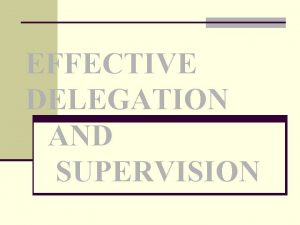Fundamentals of Delegation Chris Chen John E Jones









- Slides: 9

Fundamentals of Delegation Chris Chen & John E. Jones American Society for Training & Development

Why Delegate? • To allow supervisors to spend their personal time and energy on the tasks to which they can add the most value. • To distribute work among team members so it can be accomplished more efficiently. • To increase the commitment of team members to the organization. • To develop team members.

Why We Don’t Delegate • “I can do the task better myself. ” • “It will take too much time to explain what I want. ” • “I can do the task faster myself. ” • “I don’t want to burden my overworked staff. ” • “I enjoy doing this task. ” • “This task is so important, I can’t trust anyone else to do it. ” • “If I can’t do the task myself, I have no right to ask anyone else to do it. ”

Trust and Delegation For each task to be delegated, consider your trust of the team members’: – Motivation - do they want to do the task? – Skill level - are they fully capable of doing the task?

Trust and Delegation Trust Skills? Yes No Fully Delegate Develop No Trust Motivation? Yes Manage Re-deploy

The Four Approaches • Fully Delegate - Give full responsibility for completing the task to the team member. • Develop - Work with the team member to complete the task, or assign additional developmental resources. • Manage - Monitor progress closely to ensure schedules are met. • Re-deploy - Find another task to delegate to this person.

The “Hand-off” • Provide the big picture (Why is the task important? ). • Provide clear definition of the “deliverable” or desired results of completing the task. • Provide schedule or deadline expectations. • Verify adequate skill and resource availability. • Agree on follow-up steps, if any. • Give direction on what is needed and when, not how to do it.

Effective Delegation • Consider commitment and development concerns. • Consider motivation and skill level. • Ensure a good “hand-off. ” • Never delegate responsibility without authority (dis-empowerment)

Copyright © 2001 Chris Chen & John E. Jones
















